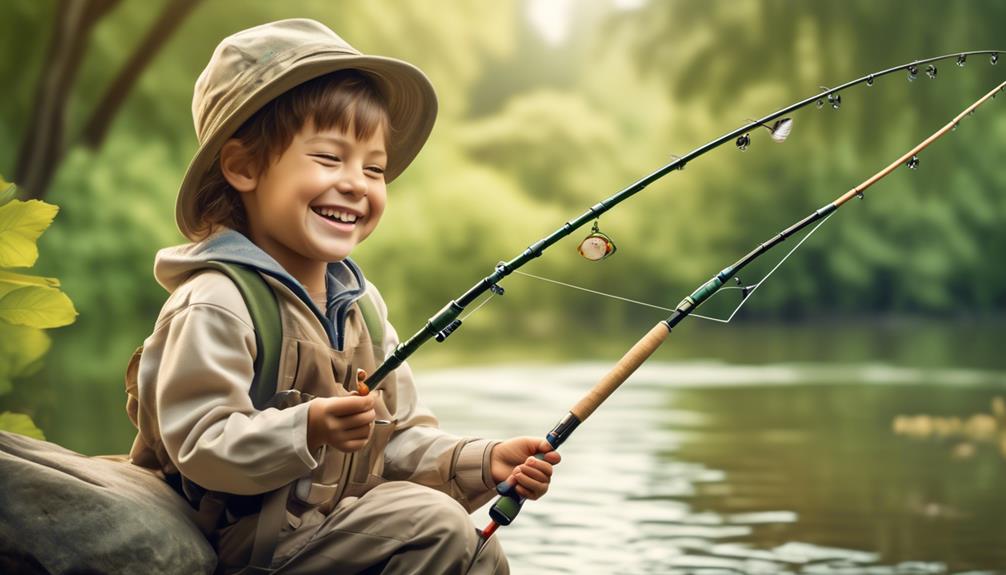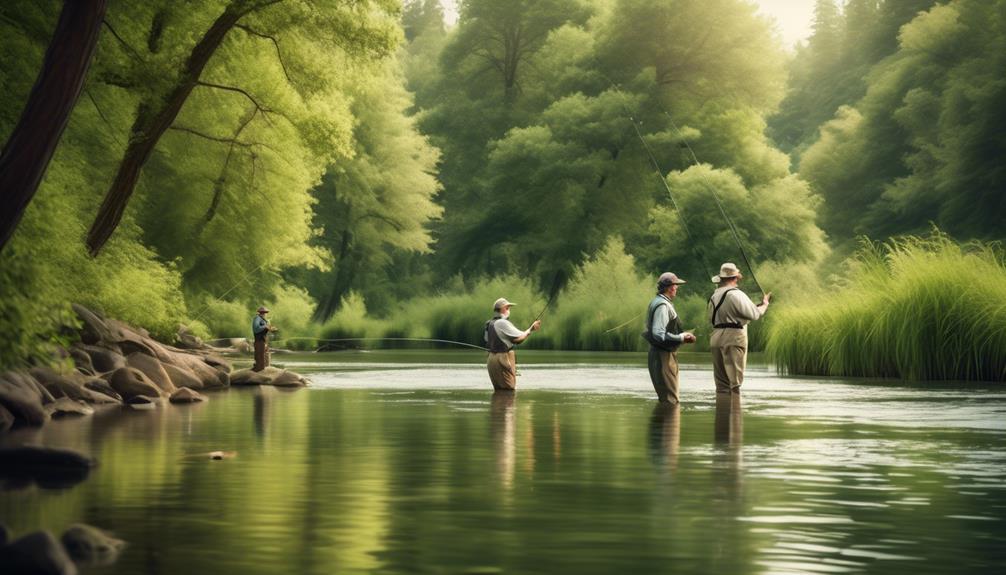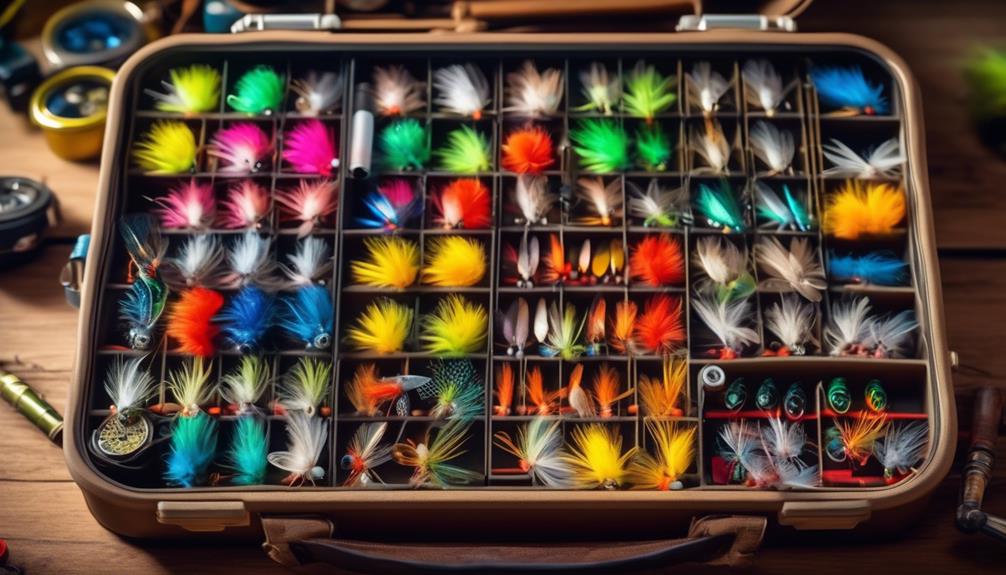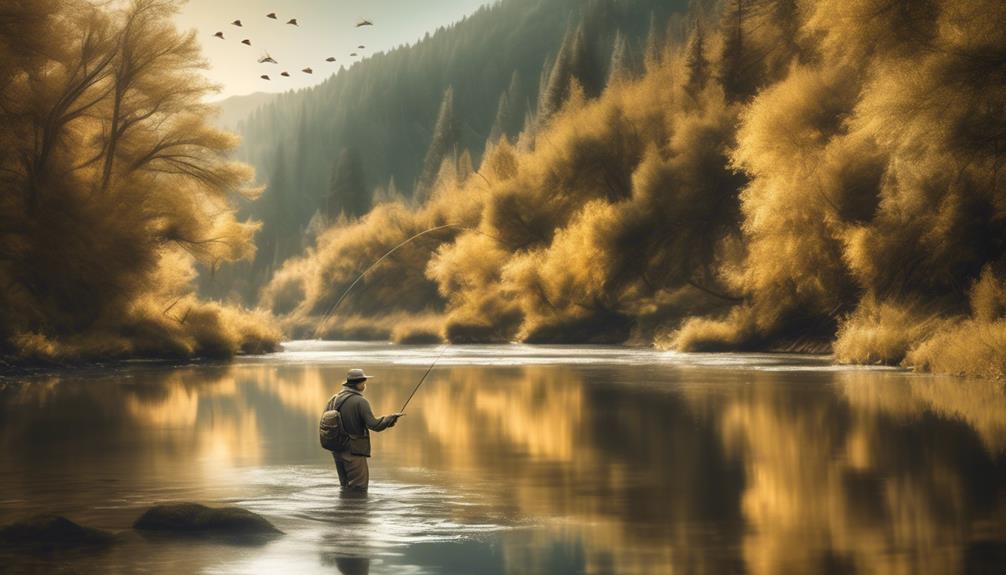You might be thinking that fly fishing is too complex or challenging for kids, but in reality, it offers a wide range of benefits that make it an ideal activity for young ones.
Not only does it provide an opportunity to connect with nature and learn a new skill, but it also promotes physical and mental development in a unique and engaging way.
As you consider the potential advantages of fly fishing lessons for kids, you'll discover how it can positively impact their lives in various ways, from building patience and fostering environmental awareness to enhancing social skills and promoting confidence.
Physical and Mental Development
Developing physical and mental skills through fly fishing can provide children with a unique and enriching experience that fosters both coordination and concentration.
The physical aspect of fly fishing involves learning how to cast the fishing line, which requires the development of fine motor skills and hand-eye coordination. As a child learns to control the movement of the line and lure, their physical development is enhanced, leading to improved dexterity and precision.
Moreover, the cognitive demands of fly fishing also contribute to mental development. By observing the behavior of the fish and adjusting their movements accordingly, children can enhance their problem-solving skills and develop a deeper understanding of cause and effect.
Furthermore, the focus and concentration required for successful fly fishing directly contribute to cognitive development. As children learn to patiently observe the water for signs of fish and carefully maneuver their line to attract them, they're honing their ability to concentrate for extended periods. This sustained focus not only improves their ability to catch fish but also enhances their overall concentration levels, which can be beneficial in various areas of their lives.
Additionally, the process of understanding the underwater ecosystem and predicting the movement of fish also stimulates cognitive development by encouraging children to think critically and strategically.
Connection With Nature
As you hone your physical and mental skills through fly fishing, you naturally develop a strong connection with nature, immersing yourself in the rhythms and patterns of the natural world. This connection goes beyond simply catching fish; it becomes a mindfulness practice, allowing you to engage all your senses and truly appreciate the environment around you.
- Mindfulness Practice
Engaging in fly fishing requires a deep level of focus and attention. As you cast your line and observe the water, you become fully present in the moment, letting go of any distractions and worries. This meditative aspect of fly fishing allows you to cultivate a sense of calm and inner peace, promoting mental well-being in a serene natural setting.
- Sensory Exploration
The natural surroundings of a river or stream offer a rich tapestry of sensory experiences. From the sound of flowing water to the feel of the gentle breeze, fly fishing encourages you to tune in to your senses. You become attuned to the subtle movements of the water, the sights of wildlife around you, and the earthy scents of the outdoors. This sensory exploration not only enhances your fishing experience but also fosters a deep appreciation for the beauty of nature.
Through fly fishing, kids can develop a profound connection with the environment, gaining a greater understanding of the interconnectedness of all living things and finding joy in the simplicity of being present in nature.
Patience and Persistence
Amidst the serene natural setting, cultivating patience and persistence becomes an integral part of the fly fishing experience for kids. As you stand by the shimmering waters, learning the angler's mindset is essential.
Fly fishing requires a high level of concentration, and mastering the art of focusing on the task at hand is a skill that will serve you well beyond the waters. Through concentration techniques, like observing the movements of the insects and the flow of the water, you develop the ability to block out distractions and hone in on the present moment. This focus not only enhances your fishing experience but also translates into a valuable life skill.
Engaging in fly fishing lessons fosters a growth mindset, where resilience building takes center stage. You'll encounter moments when the fish aren't biting, or your casting doesn't go as planned. In these instances, your patience and persistence are put to the test. Embracing the challenges and persisting through setbacks instills a sense of determination and adaptability.
These experiences shape you into a resilient individual, equipped to handle adversity with grace and composure. The journey of learning to fly fish mirrors the journey of life, where obstacles are inevitable, but with the right mindset, they become opportunities for growth. Fly fishing instills in you the values of patience and persistence, nurturing qualities that will guide you through life's adventures.
Environmental Awareness
Cultivating patience and persistence while fly fishing allows you to become more attuned to the surrounding environment and develop a heightened sense of environmental awareness. As you stand in the gentle current, you observe the delicate balance of nature, fostering a deep appreciation for the outdoors. This awareness extends beyond the thrill of catching fish, encompassing a broader understanding of the ecosystem and the need for conservation education.
When you spend time by the serene waters, you begin to appreciate the intricate web of life that thrives in and around the river. This leads to a newfound outdoor appreciation, as you witness firsthand the beauty and tranquility of nature. It's not just about catching fish; it's about respecting and cherishing the environment that sustains them.
Moreover, through fly fishing, you gain a deeper understanding of wildlife behavior and the delicate balance of the ecosystem. You learn to recognize different species of fish and understand their habitats, fostering wildlife understanding. This understanding extends to the interconnectedness of all living organisms, promoting ecosystem understanding.
Bonding and Social Skills
Developing strong bonding and social skills is an essential aspect of fly fishing, fostering connections with fellow anglers and creating lasting friendships through shared experiences on the water. Fly fishing lessons provide an excellent opportunity for kids to develop team-building and communication skills. As they work together with their peers and instructors to learn the art of fly fishing, they naturally build a sense of camaraderie and teamwork. Whether it's strategizing the best spot to cast their lines or helping each other perfect their casting technique, these experiences foster a deep sense of connection and collaboration among young anglers.
Moreover, the social environment of fly fishing lessons encourages friendship and empathy development. Engaging in a shared hobby like fly fishing allows kids to bond over their common interests and experiences. Through spending time together on the water, children learn to understand each other's strengths and challenges, fostering empathy and compassion. They celebrate each other's successes and support one another through setbacks, nurturing a sense of camaraderie and mutual respect. These interactions not only enhance their social skills but also lay the foundation for lasting friendships.
Stress Relief and Relaxation
As you immerse yourself in the peaceful rhythm of casting your line and feeling the gentle tug of the water, fly fishing provides a natural avenue for stress relief and relaxation. The serene beauty of the natural surroundings combined with the repetitive motion of casting and reeling in your line creates an ideal setting for mindfulness practice and emotional regulation.
Here's how fly fishing can help you find stress reduction and improve your mental well-being:
- The soothing sounds of the flowing water, the rustling of leaves, and the chirping of birds create a calming ambiance, allowing you to escape from the hustle and bustle of daily life.
- The gentle movement of the water and the focused attention required for fly fishing help you engage in a mindfulness practice, fostering a sense of tranquility and presence in the moment.
- As you concentrate on the rhythmic casting and the dance of the fly on the water, your mind naturally unwinds, promoting emotional regulation and reducing the impact of stressors.
In addition to the mental benefits, fly fishing offers physical relaxation as well. The act of casting and reeling in the line can be meditative, allowing you to release tension and find inner peace. By incorporating fly fishing into your routine, you can experience a holistic approach to stress relief, enhancing your overall well-being.
Skill Building and Coordination
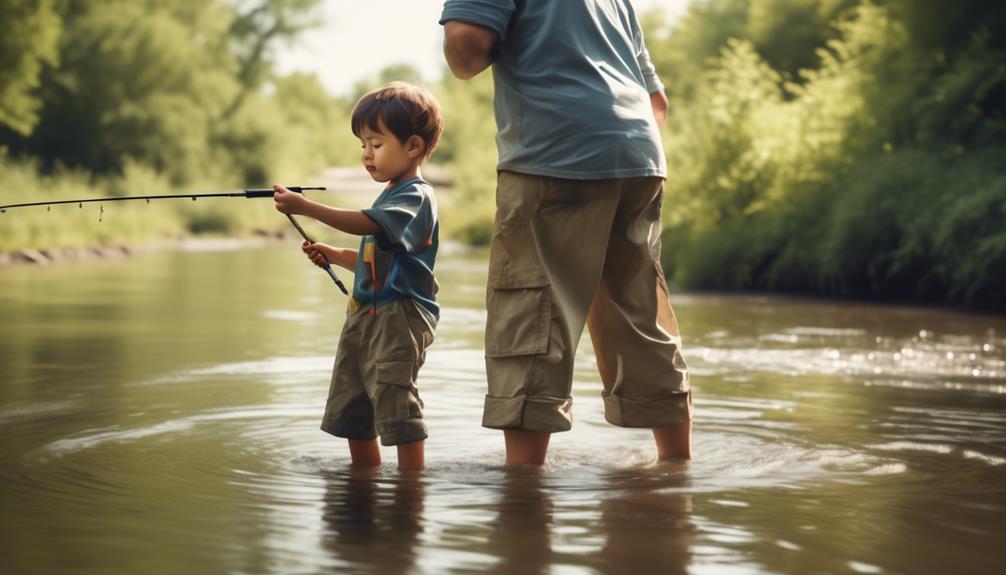
Building your fly fishing skills requires patience and practice, but the reward of mastering this art is well worth the effort. Fly fishing isn't just about catching fish; it's also about developing essential skills that can benefit you in various aspects of life.
Through outdoor learning, kids can enhance their hand-eye coordination as they learn to cast the line precisely to where the fish are. This activity also helps in improving fine motor skills as they manipulate the rod and reel.
Moreover, fly fishing demands focus and concentration. As kids learn to observe the water for signs of fish movement and patiently wait for a bite, they naturally develop these important skills. The tranquility of the natural environment further aids in enhancing their ability to concentrate. This focus and concentration can then translate to improved academic performance and better task management in other areas of their lives.
Engaging in fly fishing lessons also promotes a sense of accomplishment as kids hone their skills over time. Mastering the art of fly fishing requires dedication, and as they see themselves progressing, their self-esteem and confidence grow. This can have a positive impact on their overall development.
Confidence and Independence
Fly fishing lessons instill a sense of confidence and independence in young anglers as they learn to navigate the waters and make decisions on their own. As a young angler, you'll find that fly fishing fosters independence by allowing you to make decisions about where to cast your line and how to handle the fish you catch. This independence extends beyond the act of fishing itself and can positively impact various aspects of your life.
- Navigating the Waters
You'll learn to read the water, identify the best fishing spots, and make decisions about where to cast your line. This independence helps you develop problem-solving skills and adaptability as you navigate different fishing environments.
- Making Decisions
Fly fishing requires you to make decisions about which fly to use, how to present it to the fish, and when to set the hook. This fosters a sense of independence as you learn to trust your judgment and make quick decisions based on changing conditions.
Frequently Asked Questions
What Are the Typical Age Ranges for Kids to Start Fly Fishing Lessons?
You can start fly fishing lessons at typical age ranges when kids are ready for skill development and outdoor activities. Learning progressions vary, but around 8-12 is a common starting point for many young anglers.
Are There Any Safety Considerations or Precautions That Parents Should Be Aware of Before Enrolling Their Child in Fly Fishing Lessons?
Before enrolling your child in fly fishing lessons, it's important to consider water safety and equipment handling. Ensure parental supervision and have emergency preparedness in place. Teach kids to respect and be cautious around water.
How Can Parents Support Their Child's Interest in Fly Fishing Outside of Lessons?
To support your child's interest in fly fishing outside of lessons, consider getting them supportive gear like a proper fishing rod and outdoor activities. Encouraging them to practice casting in open spaces and exploring different fishing spots can further their skills and passion.
Are There Any Specific Environmental Conservation Practices That Are Taught During Fly Fishing Lessons for Kids?
During fly fishing lessons for kids, they are taught environmental conservation and sustainable fishing practices. They learn about catch-and-release techniques to protect fish populations and the importance of preserving natural habitats for future generations.
How Can Kids Continue to Develop Their Fly Fishing Skills and Knowledge After Completing Lessons?
After completing lessons, you can continue to develop your fly fishing skills by seeking practice opportunities and outdoor excursions. Engage in skill-building activities and utilize educational resources to enhance your knowledge and technique.
Conclusion
So, if you want your kids to learn valuable life skills while having fun in the great outdoors, fly fishing lessons are the perfect choice.
Not only will they develop physical and mental abilities, but they'll also gain an appreciation for nature, build patience and persistence, and learn the importance of environmental conservation.
Plus, they'll make friends, relieve stress, and become more confident and independent.
Give your kids the gift of fly fishing lessons today!
